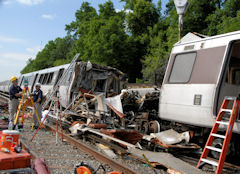by James A. Bacon
The Metropolitan Washington Airports Authority (MWAA) board pressed ahead yesterday in its bid to preserve the $2.8 billion Phase 2 of the Rail-to-Dulles project as a union job.
First, under pressure from Republican legislators, the board retracted a previous decision mandating that Phase 2 be subject to a Project Labor Agreement (PLA). Instead of requiring the prime contractor to hire workers from a union hiring hall, the board substituted a 10-percent scoring bonus for bidders whose proposals contain a PLA. That bonus gives companies using a union workforce a significant advantage in the bidding process expected to take place later this year, and it could be sufficient to even deter many non-union contractors from submitting bids.
MWAA’s action appears to be designed to skirt bills passed by House of Delegates and the state Senate that would prohibit mandatory PLAs for any project receiving state funds. If the MWAA board had kept its PLA mandate, it would have put into jeopardy a contribution of $150 in state funds that was critical to a delicate restructuring of the project financing worked out under the auspices of U.S. Transportation Secretary Ray LaHood.
The PLA is a top priority of Dennis Martire, vice president of the Laborers International Union (LiUNA), which between its national and Mid-Atlantic offices has contributed $1.1 million to political candidates since 2008, overwhelmingly to Democrats. The MWAA board is comprised mainly of appointees by Democratic officials, and Democrats in the General Assembly have opposed Republican-sponsored bills to hold the MWAA board accountable.
Second, the board heard a presentation by a consultant who warned that rates for the Dulles Toll Road could double starting next year if, in the words of the Washington Post’s Dana Hedgpeth, “Virginia doesn’t deliver on a promise to contribute $150 million for the second phase of Metrorail’s new Silver Line.” The not-too-subtle message: If Governor Bob McDonnell refuses to hand over the $150 million, he’s to blame for toll rates going up.
Under the financing arrangement agreed to by the funding parties, Loudoun County, Fairfax County, MWAA and the Commonwealth of Virginia will pay fixed sums. Any additional costs — such as a winning bid higher than the official $2.8 billion cost projection — will be covered by Dulles Toll Road commuters, who will pay higher tolls. Writes Hedgpeth:
Tolls for a one-way trip that now costs $2.25 could increase to $4.50, according to a consultant’s report prepared for the Metropolitan Washington Airports Authority and presented during a board meeting Wednesday. If the state money comes through, tolls for the same trip could still rise to $2.75.
The MWAA board appears to be playing a game of chicken with the McDonnell administration. If the governor refuses to hand over the $150 million, MWAA may have no alternative but to jack up rates on Dulles Roll Road commuters, many of whom live in Loudoun County. If that happens, Loudoun County might drop out. Is McDonnell willing to see the Rail-to-Dulles financing run off the rails because he won’t cough up the state’s promised share?
McDonnell may have no choice but to withhold the funds. HB 33, whose lead sponsor was Del. Barbara Comstock, R-McLean, not only prohibits mandated PLAs, but it seeks to ensure that “neither the state agency nor any construction manager acting on behalf of the state agency … discriminate against bidders [not adhering] to agreements with one or more labor organizations.” Arguably, MWAA’s 10-percent bonus for PLAs would discriminate against non-union contractors.
Northern Virginia needs mass transit to accommodate its transportation needs in an age of ever-increasing congestion and gasoline prices. But the process of building heavy rail is so polluted by special interest maneuvering — labor unions, big construction firms, real estate owners — that costs mount inexorably and financing becomes a game of the politically strong shifting costs onto the weak. As Old Dominion enters an era of ever tighter fiscal constraints on state and local government, we need to find a cost model for mass transit that Virginians can afford and a political process that doesn’t leave citizens feeling like they’ve been raped.



